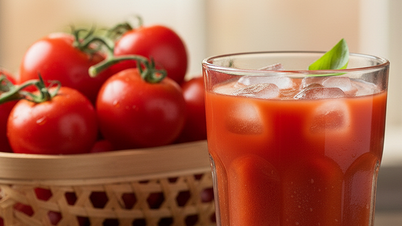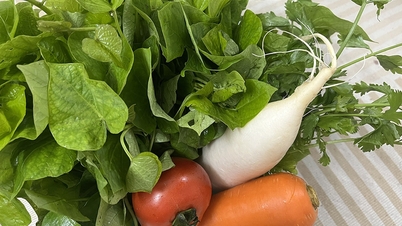Specialist Doctor Bui Thi Yen Nhi (University of Medicine and Pharmacy Hospital, Ho Chi Minh City - Campus 3) gives specific advice as follows:
Both types of fats are important for a healthy body. They provide energy, protect organs, build cell membranes, especially nerve cells, stabilize blood pressure, and help the body absorb certain vitamins and minerals, and structure some sex hormones, adrenal glands, etc.

According to recommendations, the ratio of vegetable oil and animal fat in the diet should be 2:1
PHOTO: PHUONG AN CREATED BY GEMINI AI
C PROMISES THE SAME ENERGY SOURCE
"Vegetable oil and animal fat both contain the same amount of energy. 1 gram of vegetable oil or animal fat both contain 9 kcal, generate the same amount of heat, and the energy absorbed by the body is equivalent. Vegetable oil mainly contains unsaturated fatty acids while animal fat contains more saturated fatty acids," said Dr. Yen Nhi.
Both saturated and unsaturated fats add calories, leading to weight gain and increased waist circumference if consumed in excess. A person can still become obese without consuming animal fats. However, a diet high in saturated fats can increase total cholesterol and tip the balance toward bad LDL, leading to clogged arteries in the heart and elsewhere in the body.
Unsaturated fats are further divided into monounsaturated and polyunsaturated. Good sources of monounsaturated fats are olive oil, peanut oil, canola oil, avocados and most nuts… There are two main types of polyunsaturated fats: omega-3 fatty acids and omega-6 fatty acids. Good sources of omega-3 fatty acids are salmon, mackerel, sardines, anchovies, flaxseeds, oysters, walnuts, canola oil and non-hydrogenated soybean oil. Foods rich in omega-6 fatty acids are soybean oil, sunflower oil, walnuts, cashews, almonds, peanut butter…
Saturated fats are found in animal foods such as beef, pork, poultry, whole milk products, eggs, and tropical oils such as coconut and palm oil. Because they are usually solid at room temperature, they are sometimes called "solid fats."
The American Heart Association recommends that fat intake should account for 20–35% of total daily calories, with saturated fat intake remaining below 6% of total daily calories. For people with high cholesterol, this recommendation may be even lower.
NOTES WHEN COOKING
Dr. Yen Nhi recommends using both vegetable oil and animal fat in the family's daily diet. The ratio of vegetable oil and animal fat in the diet should be 2:1.
Fried foods at high temperatures should use animal fat, because at high temperatures animal fat is less likely to be converted into trans fat (trans fat, eating foods rich in trans fat increases bad cholesterol and reduces good cholesterol). Vegetable oil should be used for salad dressings or cooking dishes that do not require high temperatures.
Oil fried at high temperature (>180 degrees C) or fried repeatedly will turn into trans fat, which is easily oxidized and produces toxic substances that cause tumors.
If you have one of the following diseases: diabetes, obesity, abnormal blood lipids, atherosclerosis, coronary artery insufficiency, high blood pressure, you should not eat a lot of fat from meat, increase the frequency of using vegetable oil and lots of vegetables and fruits... along with fish and fish fat.
A 2020 study published in The Journal of Nutrition that surveyed more than 1,000 people after an average follow-up of 14 years found that using soybean oil instead of lard, peanut oil, and refined vegetable oil blends was associated with a lower risk of type 2 diabetes. However, using vegetable oil for frying and baking at high temperatures significantly increased the risk of type 2 diabetes.
Another study published in 2023 in Current Problems in Cardiology surveyed more than 15,000 people over 65 years old in China and found that the use of lard and other animal fats in the diet was beneficial for cardiovascular health, reducing the risk of atherosclerotic artery disease more than the group using vegetable oils and sesame oil surveyed.
For children in particular, a lack of animal fat is not good for their health, especially the absorption of vitamins A and D. Not adding animal fat to their diet can also make children susceptible to rickets even though they eat many other nutritious foods.
"Thus, vegetable oil and animal fat both have their own advantages and disadvantages. To use them in the best and safest way, it is necessary to balance the ratio of animal and vegetable fats in the daily diet according to the recommendations mentioned above. In addition, it is necessary to ensure the processing method and cooking temperature are suitable for each type of fat when cooking, and limit the reuse of oil and fat," Dr. Bui Thi Yen Nhi noted.
Source: https://thanhnien.vn/an-dau-thuc-vat-hay-mo-dong-vat-tot-hon-185250701182954817.htm




![[Photo] General Secretary To Lam visits Kieng Sang Kindergarten and the classroom named after Uncle Ho](https://vphoto.vietnam.vn/thumb/1200x675/vietnam/resource/IMAGE/2025/10/09/1760023999336_vna-potal-tong-bi-thu-to-lam-tham-truong-mau-giao-kieng-sang-va-lop-hoc-mang-ten-bac-ho-8328675-277-jpg.webp)

![[Photo] President Luong Cuong attends the 80th Anniversary of the Traditional Day of Vietnamese Lawyers](https://vphoto.vietnam.vn/thumb/1200x675/vietnam/resource/IMAGE/2025/10/09/1760026998213_ndo_br_1-jpg.webp)
![[Photo] Prime Minister Pham Minh Chinh chairs a meeting of the Government Standing Committee on overcoming the consequences of natural disasters after storm No. 11](https://vphoto.vietnam.vn/thumb/1200x675/vietnam/resource/IMAGE/2025/10/09/1759997894015_dsc-0591-jpg.webp)

























































































Comment (0)